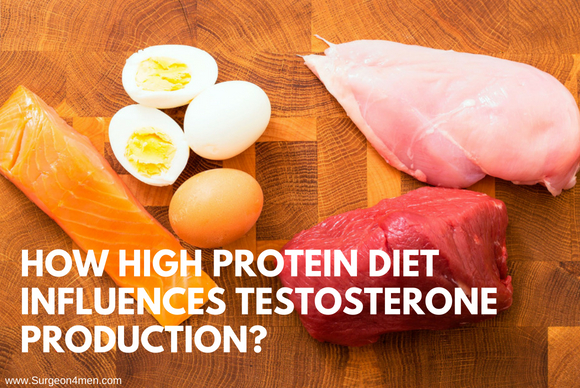How High Protein Diet Influences Testosterone Production?
It is believed that daily protein requirements in males are much higher than females. A high protein diet is considered as a must for the maintenance of healthy body weight, optimal muscle mass and normal serum testosterone levels in men. In fact, bodybuilders who performs weight lifting and other strenuous exercises to improve muscle mass, consumes proteins in high doses. To ensure intake of certain key amino acids and proteins, some athletes selectively consume high doses of certain proteins in the form of protein drinks and supplements. When it comes to healthy protein intake, a lot of men don’t really understand the impact of high protein diet on the serum testosterone levels in males.
The consumption of proteins in large amounts may lead to serious side effects including slow metabolism, poor muscle gain along with negative impact on the hormone production.
Does High- protein diet impact testosterone production?
Protein is a product of one or more amino acid that are connected via powerful peptide bond. Different foods and protein sources comprises of different amino acid combination in their structure. The protein sources that consist of all essential amino acid are considered as ‘complete protein’ for e.g. eggs, milk and meat.
Testosterone production and muscle mass is highly dependent on the type and amount of proteins we consume.
Impact of Amount of protein consumed on testosterone level:
It is a well-known fact that inadequate intake of protein can significantly reduce your testosterone levels and overall muscle mass. In order to gain muscle mass, healthcare providers recommend a daily intake of about 0.8 gram of protein/ pound of lean mass by males. Even 0.37 g/lbs is sufficient to maintain a positive nitrogen balance in average males.
Researchers have been analyzing the impact of high protein intake on the quality of muscle mass and testosterone levels. According to a new study conducted by Volet and his team, investigators suggested that excessive amount of protein intake exerts negative impact on the hormonal health of an individual. As part of the study, trained participants were divided into various group based on their diet and composition of nutrients for e.g. carbs, carbohydrate, low fat or high protein diet. After the analysis, it was observed that people who were on high protein diet were found to have the lowest testosterone levels, compared to other groups.
Another study conducted by Anderson and his team on a group of untrained volunteers revealed similar findings. As part of the study, study participants were divided into two groups; first group was put on a high carbohydrate diet and the other group was put on a high protein diet. The fat intake in both groups was kept equal. After the study period, results suggested that the group on high protein diet reportedly had lower testosterone and high Cortisol levels (stress hormone). In carbohydrate group, slight increase in SHBG production was observed.
Impact of type of protein consumed on testosterone levels:
Testosterone levels are also affected by the type of protein we consume. Unfortunately, there hasn’t been much research on this subject. A new research suggests that animal proteins are much better than soy protein in the production of androgens. This is probably due to different composition of amino acids.
Conclusion:
Human body needs protein but in moderate amounts as too much protein intake is harmful for health. Likewise, too low protein intake is also bad for health. Protein consumption should be in optimal quantity for better health and wellness.
